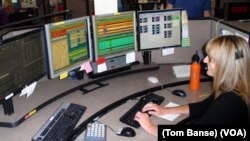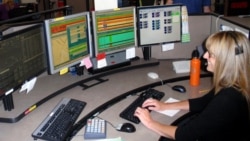The last thing a 911 emergency center operator wants to say when answering a caller in distress is: "I can't understand you."
But that can happen when call-center dispatchers only speak English, and in the increasingly polyglot American society, some people in distress inevitably can't communicate in English.
Calls in a foreign language are a daily - or almost daily - occurrence in urban counties across the United States, which leads many 911 centers to contract with an emergency translation service.
Veteran call-taker and training manager Andrea Tobin, at the Willamette Valley Communications Center in Salem, Oregon, admits that the wait for an interpreter to join the call can be excruciating, but dispatchers are trained not to let that tension come through in their voice.
"When it is Spanish, it is pretty quick and easy for us to understand,” Tobin said. “When it is a different dialect, it becomes more complicated for us because we don't recognize them all. And then they put us on hold while they get an interpreter for the language that we need.
"That can sometimes be very quick. Sometimes it is 30 seconds or a minute," she said.
In the Northwest, Spanish is by far the most common requested language for emergency translation, typically followed by Russian, Vietnamese and Chinese dialects in varying order.
Lately, call-center supervisors in Boise and Seattle said they are getting more calls from people speaking African and Middle Eastern languages.
Translation companies such as Telelanguage and LanguageLine boast they have interpreters for 200 languages available.
Willamette Valley 911 director Mark Buchholz said having interpreters on call is less expensive, and easier, than hiring bilingual operators. Three of the 55 people who answer calls are certified bilingual - two in Spanish, one in Russian.
Buchholz said centers like Willamette Valley's actively recruit for bilingual call takers, but they're hard to find.
"It's really tough to require a second language as a requirement to work for us. While it is important - we do pay a bonus - the volume isn't significant enough for us to have that as an exclusive requirement for hiring," he said.
Interpreters who join calls may be located halfway across the country.
The companies they work for advertise this as a rewarding job that can be done from home. The same companies also translate for business call centers, banks, schools and courts.
One thing call-center supervisors say would be helpful for non-English speakers is that they know how to say the name of their country and native tongue in English, in case they need to call for help.






